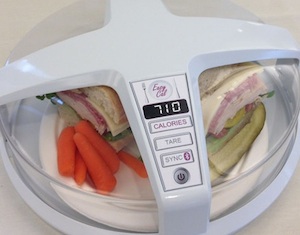
Doesn’t cook any faster.
GE is floating a prototype sensor suite for cookware that will measure the caloric and, eventually, nutritional values of microwave meals. It’s an interesting concept. But it’s still a lab concept. It does point to two things, though.
First, consumer goods manufacturers are looking at ways to combine sensors, connectivity and powerful server-side processing to deliver rapid, granular data to people on a routine basis. Everything around us is measurable, and creating devices that can automatically gather that data and send it on for processing – make it meaningful – is rapidly becoming commonplace.
Second, and more particularly, giving people accurate readings of the calories they’re consuming as well as, with FitBit-type devices, what they’re burning is a big step toward real-time health management, rather than disease detection. The long term benefits could be huge.
The question is whether people want that much information, and whether they’ll integrate it into their daily lives. It seems like a great thing at first, but in order for people to adopt it on an ongoing basis, they’ll need to see clear and consistent short term benefits, too. Tastier meals, easier preparation, painless cleanup are all possibilities – if people save time and effort, or get a better immediate result from the same effort, they’ll want to use this kind of gizmo over and over again.
If it reduces the time and effort to do daily tasks and makes life simpler, new technology like this will take off in the consumer market. If it just adds an additional step to existing chores in exchange for distant benefits, it’ll quickly end up in the back of the cupboard.
